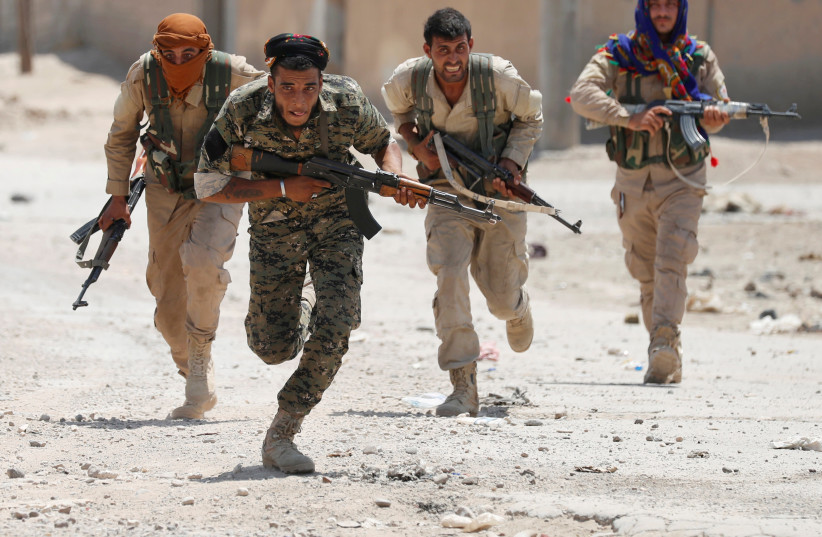Turkey has tried to strong-arm the US after US chairman of the Joint Chiefs of Staff Mark Milley made a recent trip to eastern Syria.
The US is in Syria to fight ISIS and its key partner force is the Syrian Democratic Forces, which the US helped create back in 2015. The SDF lost thousands of fighters defeating ISIS and they work closely with the US.
Turkey, which is a member of NATO, has accused the US of supporting “terrorists” in Syria and has carried out numerous drone attacks on the SDF.
In 2018, Turkey also invaded the Kurdish region of Afrin and in 2019 attacked the SDF. Turkey claims the SDF is actually another group, called the YPG, which Turkey accuses of being “terrorists.”
Now Ankara has summoned the US ambassador over the US general’s trip.

Turkish media on Monday appeared to brag that they had got the US State Department to say that MIlley “met only with US troops while in Syria,” according to the US State Department.
“Of course, when it comes to General Milley’s visit, we’d refer you to the Department of Defense; however, it’s our understanding that General Milley met only with US troops while in Syria. It was only an interaction with American service members,” Ned Price, a state department spokesman, said at a daily press briefing, according to Turkey’s pro-government Anadolu media.
Turkish elections and US messaging on Syria
Turkey is in the midst of a presidential election campaign. Ankara is recovering from an earthquake but continues to carry out airstrikes in Syria and to threaten Kurds and Yazidis in Iraq.
Ankara claims its conflict is not against Kurds but it often targets Kurdish forces, which it calls “terrorists.” There is no evidence these forces, such as the SDF, have ever carried out any attacks on Turkey. Turkey’s airstrikes often harm Christians and Yazidis and other minorities in Syria, as well as harming civilians.
US messaging on Syria appears to want to placate or appease Ankara’s views. In another incident in February, US Secretary of State Antony J. Blinken spoke with NTV and was asked about the US work in Syria. According to the interviewer, the US was fighting ISIS, a terrorist group, by working with the YPG, which Turkey says is also a terrorist group. “You didn’t comment during the press conference. Would you like to?” the interviewer said.
Blinken then said “we are working closely with the government to make sure that we can address both concerns, the concerns that Turkey has about the border, and particularly we strongly oppose any cross-border attacks. We of course are not in favor of a Kurdish state in northern Syria. And it’s very important that everyone take steps to avoid a conflict and keep the focus on Daesh, on ISIS.”
The comment about a “Kurdish state” didn’t relate to the question. Ankara has not accused the US of creating a “Kurdish state,” it has accused the US of supporting “terrorists.”
In both cases, the US messaging on Syria is confusing. In the recent comments, Turkey appears to have got the US to say it doesn’t even meet with its SDF partners. In the other comment, it got the US to say the US doesn’t support a “Kurdish state,” even though the SDF and others in Syria have not said they want a “Kurdish state.” The US is thus opposing something that no one says is even on the agenda.
So what is going on?
On Monday, the Turkish Foreign Ministry summoned US Ambassador to Ankara Jeff Flake and sought an explanation over Milley's visit to regions “occupied by the YPG/PKK terror group in northeastern Syria, according to diplomatic sources,” Turkey’s media said.
Ankara’s demands to the US come amid a presidential campaign in Turkey.
The BBC said this week that the opposition parties are rallying behind Kemal Kilicdaroglu. Turkey’s ruling AKP Party wants yet another term for the authoritarian president, Recep Tayyip Erdogan. It’s not clear if the US is trying to reduce tensions in order to not give the AKP a talking point. The ruling party has recently claimed it will rebuild areas harmed by a massive earthquake. In addition, the ruling party has prevented Sweden and Finland from joining NATO. US-Turkey relations have gotten worse over the last decade and Turkey has been working closely with Russia.
